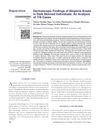 21 citations,
January 2014 in “International Journal of Trichology”
21 citations,
January 2014 in “International Journal of Trichology” The study concluded that yellow dots are a common and useful sign for diagnosing alopecia areata in dark-skinned individuals and may indicate the severity of the condition.
 16 citations,
March 2014 in “Journal of the European Academy of Dermatology and Venereology”
16 citations,
March 2014 in “Journal of the European Academy of Dermatology and Venereology” Korean patients with PCOS often have skin problems like acne and excess hair, with different symptoms based on their specific PCOS type.
 5 citations,
May 2022 in “Molecules”
5 citations,
May 2022 in “Molecules” Botulinum toxin is effective for various skin conditions, but more research and awareness of side effects are needed.
 3 citations,
January 2018 in “İstanbul Kuzey Klinikleri”
3 citations,
January 2018 in “İstanbul Kuzey Klinikleri” Hair loss was found in 37.4% of surveyed rural high-school students in Eskisehir, Turkey, affecting their quality of life, especially in general health and mental well-being.
 53 citations,
January 2017 in “Skin appendage disorders”
53 citations,
January 2017 in “Skin appendage disorders” Botulinum toxin shows promise for various skin conditions but requires more research for confirmation and standardized use.
 1 citations,
February 2020 in “Cureus”
1 citations,
February 2020 in “Cureus” Women with PCOS are more likely to have skin problems like excessive hair, acne, and hair loss.
50 citations,
November 2015 in “Journal of pharmacological sciences” α-mangostin nanoparticles improved acne with minimal irritation.
 November 2023 in “International Journal of Cosmetic Science”
November 2023 in “International Journal of Cosmetic Science” Wheat polar lipid complex reduces hair loss and improves hair growth in women.
21 citations,
December 2007 in “Journal of Investigative Dermatology” Hair follicles evolved from oil glands, with hair aiding secretion transport.
 97 citations,
March 2009 in “Dermato-endocrinology”
97 citations,
March 2009 in “Dermato-endocrinology” Hormones significantly affect hair and oil gland function in the skin, and more research is needed on skin-related hormone disorders.
 82 citations,
January 2000 in “Hormone Research in Paediatrics”
82 citations,
January 2000 in “Hormone Research in Paediatrics” DHEA stimulates skin oil glands and could help postmenopausal women, with potential for acne and excessive hair growth treatments.
 40 citations,
January 1994 in “Skin Pharmacology and Physiology”
40 citations,
January 1994 in “Skin Pharmacology and Physiology” Male hormones affect oil-producing skin cells differently based on their body location, and the drug spironolactone can reduce these effects.
 6 citations,
August 2014 in “Toxicologic pathology”
6 citations,
August 2014 in “Toxicologic pathology” Blocking DGAT1 reduces oil gland size in mice and dogs, but only mice experience hair loss.
6 citations,
September 2021 in “Autophagy” Autophagy prevents early aging and maintains lipid and pheromone balance in mouse glands.
38 citations,
January 2017 in “PPAR Research” PPAR-γ helps control skin oil glands and inflammation, and its disruption can cause hair loss diseases.
 April 2018 in “Journal of Investigative Dermatology”
April 2018 in “Journal of Investigative Dermatology” Nicotinic acid reduces excessive oil production in skin cells by activating a specific receptor, which could help treat acne.
12 citations,
May 2021 in “Clinical Interventions in Aging” Men with androgenetic alopecia have oilier and less hydrated scalps, especially in sensitive areas.
 11 citations,
November 1982 in “British journal of dermatology/British journal of dermatology, Supplement”
11 citations,
November 1982 in “British journal of dermatology/British journal of dermatology, Supplement” Testosterone and some of its forms can strongly stimulate oil gland growth in skin.
 10 citations,
January 2016 in “Dermatology”
10 citations,
January 2016 in “Dermatology” Psoriasis lesions have fewer and smaller oil glands, which might affect the condition's development.
January 2021 in “Figshare” Autophagy helps delay aging in mouse glands, maintains fat balance, and controls scent production.
3 citations,
September 2021 in “BioEssays” Dandruff might be caused by changes in how hair follicles naturally release oils and an immune response to this imbalance.
 23 citations,
January 2001 in “Chemical & Pharmaceutical Bulletin”
23 citations,
January 2001 in “Chemical & Pharmaceutical Bulletin” New pregnane derivatives are effective at inhibiting an enzyme linked to hair loss and reducing oil gland activity.
 1 citations,
April 2024 in “International Research Journal of Modernization in Engineering Technology and Science”
1 citations,
April 2024 in “International Research Journal of Modernization in Engineering Technology and Science” Herbal shampoo cleans hair well and is safer than regular shampoos.
 January 2019 in “ARC journal of pharmaceutical sciences”
January 2019 in “ARC journal of pharmaceutical sciences” Acne can be managed with various treatments and requires psychological support due to its emotional impact.
3 citations,
June 2008 in “Springer eBooks” Hair care products clean, protect, style, color, and change hair structure.
January 2020 in “대한미용학회지” Natural ingredients like plant extracts and marine life show promise for improving scalp health and reducing hair loss.
 January 2017 in “Clinical approaches and procedures in cosmetic dermatology”
January 2017 in “Clinical approaches and procedures in cosmetic dermatology” Men are increasingly seeking quick-result cosmetic treatments for their thicker, oilier skin and hair loss issues.
 17 citations,
June 2017 in “Journal of pharmaceutical sciences”
17 citations,
June 2017 in “Journal of pharmaceutical sciences” Researchers developed a nanomedicine for acne treatment that delivers medication with less irritation and is non-irritating for oily skin.
November 2022 in “Journal of Investigative Dermatology” Targeting inflammation can improve scalp and hair health.
 6 citations,
July 2017 in “Biochemical and Biophysical Research Communications”
6 citations,
July 2017 in “Biochemical and Biophysical Research Communications” The Hairless gene is crucial for hair cell development, affecting whether skin cells become hair or skin and oil gland cells.



















